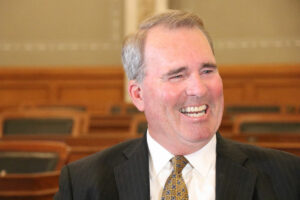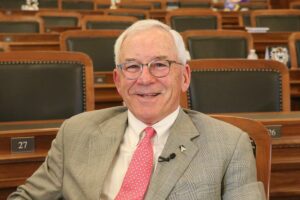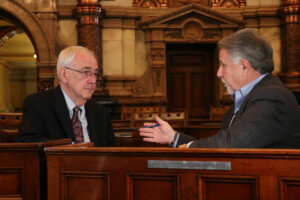Search Results

Interview of Robin Jennison, October 4, 2019
Interviewed by Jim McLean
Jim McLean’s interview of Robin Jennison is lengthy but full of interesting stories and anecdotes about what went on in the legislature in the last decade of the 20th Century. McLean teases out both the politics and policy from Jennison’s experiences in the House with the 1992 school finance bill and his Republican alternative. Jennison shares his philosophy on how to fund schools, lower property taxes, leadership races and his rapid rise to Speaker in the 1999-2000 sessions. The strategy he used to pass the 1999 transportation bill out of the House is clever. There is Show Morean anecdote about replacing carpet in the Judicial Center and what it took to get that appropriation passed. Jennison describes his role as Secretary of Wildlife and Parks and working under Governor Brownback. Show Less

Interview of Kent Glasscock, June 11, 2021
Interviewed by Alan Conroy
As Majority Leader, and then as Kansas House Speaker, Kent Glasscock found ways to work productively with the conservative wing of the Republican caucus. The first part of the interview describes how Glasscock decided to run for office and his six campaigns.
As he moved up in leadership, the interview talks about several situations where his views as a moderate Republican clashed with the growing number of conservatives in the Republican caucus. Finally, Speaker Shallenburger called Glasscock to his office and together they made peace and subsequently worked well together. Glasscock cites the school finance bill that Show Moredealt with a capital outlay for school buildings as one of his best, most long-lasting accomplishments as well as the Confined Animal Feeding legislation. Styling himself as a true "policy wonk", Glasscock's descriptions of legislative antics in passing legislation are really interesting. This interview gives a picture of how the legislature transitioned to conservative control during his 12 years in office. Show Less

How Things Got Done in the Kansas Legislature
In this video, compiled from interviews on this site, 12 former Kansas legislators who served from 1960-2010 talk about why they ran for public office, how they developed and executed strategy, and how different leaders perceived their roles and what they accomplished. Among others you will hear Dick Bond describe initiating renovation of the Capitol, Steve Morris recall creating a plan to train more engineers, and Fred Kerr explain the need for reappraisal and classification. You also hear Mike Hayden recount lessons learned from two Speakers with vastly different styles who preceded him – Pete McGill and Wendell Show MoreLady. Show Less

Interview of Mike O'Neal, April 16, 2021
Interviewed by Alan Conroy
Former Speaker Mike O'Neal's interview covers his 28 years in the Kansas House and his impact as Chair of the House Judiciary Committee on the Kansas legal system, both criminal and civil. In fact, O'Neal chaired the House Judiciary Committee three different times totaling 13 years and also served as Chairman of the House Education Committee and a redistricting committee in 2002. He has been involved with workers compensation issues and medical malpractice. O'Neal explains his own evolution in thinking as he, and his constituents, became more conservative. He candidly discusses his race for Speaker of the Show MoreHouse and compares the leadership styles of other speakers with whom he served. O'Neal left the House in 2012 after finishing his second term as Speaker to take a position with the Kansas Chamber of Commerce as its chief executive officer. After four years with the Kansas Chamber he retired to open his own legal consulting and governmental relations firm, O'Neal Consulting, LLC. Show Less

Interview of Tim Emert, October 4, 2019
Interviewed by Jim McLean
Tim Emert's interview covers his Senate career in the last decade of the Twentieth century, following passage of a markedly different school finance bill in 1992 and with a divided Republican caucus in the Senate--a time of big change. Emert stepped into the chairmanship of the Senate Judiciary committee immediately and later moved up to Majority Leader by a one-vote margin. The interview is filled with descriptions of coalitions he formed to get legislation passed. As Judiciary chair Emert dealt with both the death penalty, which he personally opposed, and a bill restricting late term abortions which Show Moreno one liked but passed. He worked with Christine Downey to get a major policy change regarding community colleges. There are also descriptions of his work on the State Board of Education and later, the Board of Regents. Emert describes himself as neither moderate or conservative, but "a realistic Republican." As Majority Leader he talks about the "juggling act" trying to keep communication with the conservative House Speakers (Shallenburger and Jennison) and the Senate. He explains the tension in having both the poorest and richest counties in his district and trying to provide equalization of school funding. The interview touches on the renovation of the Capitol and also renovation of Cedar Crest. Show Less

Interview of Richard (Dick) Bond, September 6, 2019
Interviewed by Joan Wagnon
Former Senate President Dick Bond candidly discusses his 14 year career in the Kansas Senate which followed a 25 year career in Washington DC as chief of staff for 3 congressmen. Well known in Kansas Republican circles, Bond was appointed to fill a vacancy when Senator Jack Walker became Lieutenant Governor. Bond compares the politics of Washington to Kansas. He saw the passage of liquor-by-the-drink as a boon to economic development. Bond is most proud of the renovation to the Kansas Capitol which was started under his term as President of the Kansas Senate. He Show Morereflected on the changes in the Republican party in recent years and the role the Right to Life movement played in those changes. Show Less

Interview of Doug Mays, September 25, 2020
Interviewed by Alan Conroy
This interview with former Speaker Doug Mays contains good insight into how the Kansas House of Representatives functioned at the end of the Twentieth Century and the first decade of the Twenty-First. The institution was changing as its membership became more conservative. Mays describes in great detail how its leadership dealt with controversial issues such as school finance and taxation. Mays cites two issues as his proudest accomplishments: passing a sales tax to lower property taxes for Washburn University and neighborhood revitalization legislation. Speaker Mays notes that every time a bill came through, he read Show Moreit. His discussion of the power of the speaker is illustrated with numerous examples. “ I believed in the process. I believed that the speaker was the keeper, the protector of the process.” He promoted civility in the body and developed a good relationship with the Minority Leader Dennis McKinney which allowed him to end the 2005 Special Session without adjourning sine die. Mays promoted greater use of technology for the legislature and tightening of deadlines to ensure smooth operations. There are several examples of his relationship with governors. Anyone interested in being a speaker should read this interview. Show Less

Interview of Jene Vickrey, September 11, 2020
Interviewed by Alan Conroy
Jene Vickrey talks candidly about his first campaign (where he narrowly defeated then-Speaker Marvin Barkis) as having not much money but "a lot of shoe leather." He discusses his political mentors, Melvin Neufeld and Tim Shallenburger and the advice they gave him in the early years, about lobbyists and handling hot-button issues. He learned not only from his mentors, but other colleagues who helped him, some of whom were Democrats. The interview covers bills he sponsored, many of which were pro-life legislation. He describes the "tough challenges" such as foster care systems (he was a foster Show Moreparent), school finance and taxes. He didn't support casino gambling although his constituents were in favor of it. The interview concludes with Vickrey reflecting on the changes he saw in 28 years, the growth in the number of conservatives and a loosening of the control of the House from leadership to the body itself by rules changes for more transparency as well as becoming more partisan. Show Less

Interview of Robert (Bob) Tomlinson, August 2, 2024
Interviewed by Chris Courtwright
Chris Courtwright's interview of Bob Tomlinson, former city councilman, legislator and Assistant Insurance Commissioner is one of the longest and most complete undertaken by KOHP. The entire interview (2 hours 23 minutes) is posted here. But in addition, several shorter clips, taken from the interview, are posted below and will also be used as part of Resources for Educators. Tomlinson's interview covers his wide political experience and lessons he learned. He tells lots of funny stories about other prominent politicians of the era and shares his political philosophy and technics for "vote-counting" for Speaker Glasscock and Show Moreothers. He also comments on the public policy issues at the time of the interview, including health insurance mandates, Medicaid expansion, school vouchers, the need for full funding for special education.
Highlights -- short excerpts from the interview
